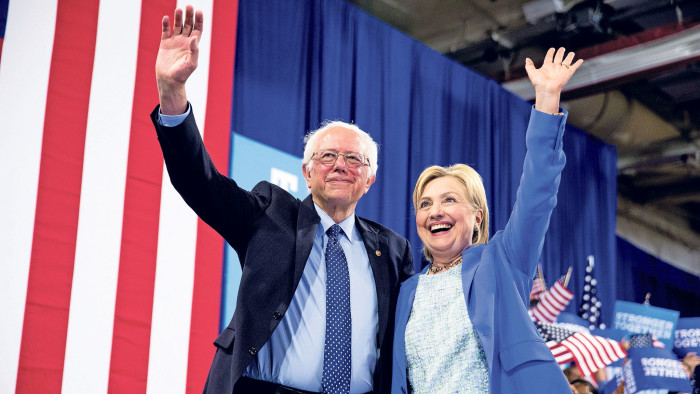US markets braced for trading tax grab from Democrats

Roula Khalaf, Editor of the FT, selects her favourite stories in this weekly newsletter.
Each US trading day, millions of futures contracts, billions of shares and hundreds of billions of dollars of bonds change hands. The volumes provide streams of revenue to exchanges and trading platforms — and some in Washington want to divert a rivulet to the federal government.
A group of Democratic politicians have proposed a financial transaction tax on trades of stocks, bonds and derivatives. Hillary Clinton, the Democratic presidential nominee, is seeking a narrower tax on high-frequency trading (HFT), the technique of using computers to execute transactions in fractions of a second.
Such taxes have been floated in Congress for years without success. But market participants are paying close attention nonetheless. “It’s very much alive,” says Bill Harts, chief executive of Modern Markets Initiative, a trading industry group.
Bernie Sanders, the Vermont senator and former presidential candidate, and Keith Ellison, a Minnesota representative, have each sponsored bills that would impose a tax of 0.5 per cent on the sale of stocks, 0.1 per cent on bonds and 0.005 per cent on derivatives such as futures. Another, introduced by Rep Peter DeFazio of Oregon, would levy a uniform 0.03 per cent tax on stock, bond and derivative transactions.
Mrs Clinton’s plan would place a tax on orders — or messages that signal an intent to buy or sell — rather than transactions in stock markets. Specifically, her campaign says its tax “would hit HFT strategies involving excessive levels of order cancellations”. Rapid-fire entry and cancellation of orders have become a central allegation in recent legal cases against “spoofing” — conduct in which traders try to dupe other traders by generating a false sense of interest in buying or selling.
Transaction taxes or fees are not a new concept. In the UK, traders pay a 0.5 per cent stamp duty on share transactions. In the US, investors are charged a 0.00218 per cent fee each time they sell a stock to help fund the Securities and Exchange Commission.
But the motivation behind the new proposals is different. According to Mr DeFazio’s office, his bill would discourage financial speculation and raise billions of dollars of annual revenue that could fund free university education or repairs to infrastructure.
A study of the Sanders tax proposal by the University of Massachusetts Amherst estimated it would generate $300bn per year in revenue even if it led trading volume to fall by half.
Marcus Stanley, policy director of the lobby group Americans for Financial Reform, supports transaction taxes, calling the DeFazio proposal “a serious revenue raiser”. He hopes the issue will be part of a debate over corporate tax reform after the election.
Critics say the logic behind such a tax is contradictory, as deterring trading would leave fewer transactions to tax. A 2010 study written by an academic at Johns Hopkins University and funded by Virtu, a high-frequency trading firm, said: “The dual goals of FTTs to deter speculation and raise revenue are irreconcilably at odds with one another.”
The US asset management industry is also sceptical. Vanguard, the $3.8tn fund house, has lobbied against transaction taxes, believing they would “result in unintended and considerable costs for individual investors”. The asset manager adds: “A tax ostensibly aimed at Wall Street would ultimately be detrimental to Main Street.”
In derivatives markets, the White House and some Democratic politicians have proposed a trading fee to fund the Commodity Futures Trading Commission, the federal regulator. The industry’s self-regulatory body, the National Futures Association, already tacks a one penny fee on each side of a contract to help fund its operations. In fiscal 2015, those assessments brought in $33.2m.
From 1917-38, US futures sales were subject to a federal transaction tax. The tax caused trading volume to fall in Chicago’s wheat and corn markets, but measures of market quality did not immediately worsen and commercial players such as farmers continued to use the market as usual, a study by the CFTC chief economist’s office found.
However, the tax reduced profits for middlemen on the exchange floor. In time they reacted by pressuring the exchange to make adjustments that “effectively allow[ed] the tax burden to be passed on to the end-user”, the CFTC report says.
Mrs Clinton’s proposal on high-frequency trading worries firms in that industry, which has been engaged in a public relations battle since Michael Lewis’s 2014 book Flash Boys alleged the market was rigged in their favour.
Mr Harts of Modern Markets Initiative, which is backed by high-frequency trading companies, says that cancelling and replacing orders is not illegitimate and is in fact important for determining fair prices. If the aim of the proposal is to stop spoofing, that has already been outlawed, he says.
“It seems redundant to put a tax on something that’s illegal. People who are spoofing should be subject to prosecution,” he adds.
Comments